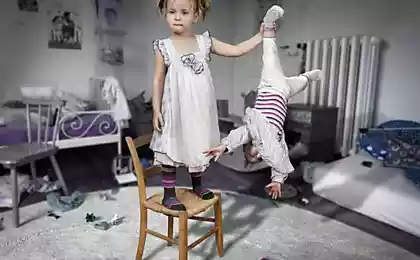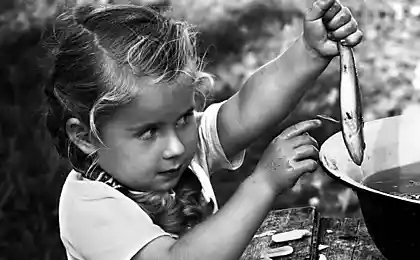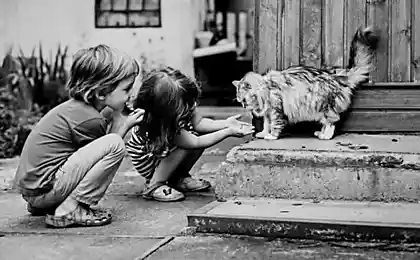460
22 alternatives to punishment

© Norman Rockwell
Knowing what not to do – is only the first step.
Many parents recognize the harmful effects of physical or verbal punishment. They know that yelling, spanking and hitting destroys self-esteem, cause anger, hurt learning and are destroying the relationship between parent and child...
However, knowing what not to do, is only the first step. Parents are thinking about what to do instead. Unfortunately, most modern books and articles recommend "alternatives", which in reality are relative alternatives to punishment. Among them, time out, deprivation of privileges and the so-called "natural" consequences.
All these methods have a lot in common with physical punishment, and all carry essentially the same message:
Parents are not interested in the unmet needs of the child, which led to undesirable behavior; a parent will use his power and authority over the child.
The most significant is that these approaches make it clear to the child that the man he was destined to love and who to trust, wants to hurt him. This message produces "error in the brain", because it is entirely alien to the intuitive understanding of the child what love is.
Ultimately, all of these approaches miss the best opportunities for learning. They drive the child into fantasies of revenge when he is unable to focus on the current issue. These alternatives to punishment are those that help the child to grow and learn a healthy way. Perhaps there are few in the life of greater joy, than to let our child teach us what is love!
1. Prevent unwanted behavior, respond to the needs of the child as soon as they are expressed. If your current needs are satisfied, the child is ready to take the next step in learning.
2. Secure and environment friendly attitude to the child. It is foolish to leave a small child expensive things when they can just get to that time, the child will grow up to treat them carefully.
3. Apply The "Golden Rule". Think about how you would like them to treat you in a similar situation, if you were to place your child. Human nature is human nature regardless of age.
4. Show sympathy and empathize with your child. Even if the child's behavior seems irrational, underlying feelings and needs are real to the child. The expression in the key "You look upset" is a good way to show your child that you are on his side.
5. Check with the child how he feels, so he knew that you understand him and care about him, and that he will never be rejected, if it is to experience any, perhaps not entirely desirable feelings and emotions. For example, "I'm scared, too, when I was a kid".
6. Satisfy the underlying behavior needs. If we punish for external behavior, the still unmet need will continue to manifest itself in other ways as long as they, in the end, will not be satisfied. Questions such as "are You angry because today I had a long conversation on the phone? Let's take a walk together?" – help the child to feel that his love and understand.
7. Whenever possible, find solutions to "win – win", to meet the needs and interests of each. Learn to cooperate and negotiate.
8. Teach your child the belief that you love him and that he is valuable. So-called "bad" behavior is often the child's attempt to Express his need for love and attention in a way that it is currently available. If he could Express his need in a more Mature way, he would have done it.
9. * Shift the focus of their attention from a situation that was too stressful for a child to cope with it at the moment: "let's take a break. What would you like to do now?"
10. Ensure that you and your child received during the day a sufficient amount of nutritious food that the blood sugar remained high. Often, a small snack is the best solution.
11. Breathe! When we experience stress, we need more oxygen. It makes us breathe and often superficial. Even a small amount of deep breaths will help us calm down and think more clearly.
12. We do not expect that the car will go, as long as its fuel tank will not be filled. And we should not wait from the child that he will begin to do something useful, if his "emotional tank" is empty. Do three things to fill the emotional tank of the child: eye contact, a soft touch and a full, unshared with anything else or anyone's attention.
13. Chamomile tea has a nice relaxing effect as for adults and children. Drunk for an hour before laying to sleep nursing mother, he will act the same way a sedative and the baby. Older children might enjoy a cold chamomile tea.
14. Arrange a time out together with your child. Change of scenery – even if it's just out on the street, can really change the situation for parent and child.
15. Make cards-reminders. For example: "Support the dream of a child" "Think about the child's behavior: what does he feel?", "The child in the game is a young Explorer discovering the world", " Show a child your love and words, and actions, Children have a reflex reaction to how they are treated," etc.
16. Do baby massage. Massage before bedtime will help the child tight to sleep well to recover and recharge for the next day.
17. Offer choices. Children need to feel that they have the right to vote. Offer choice, even if it seems quite neznachitelnym ("do You want to drink from a red or blue Cup?"), will help the child to feel that he himself has something to say about your life, especially if recently he had to face with some independent of him changes.
18. Try to talk in a whisper. When the voltage is high, the whisper will help attract the child's attention, and to calm down to the parent.
19. Give your child the time. The sentence "Let me know when you're ready to share the toy / get in the car / putting on jacket" will give the child a feeling of autonomy, and it will be easier to cooperate.
20. Let's time ourselves. Count to 10 (silently), or ask the time ("I'm not sure what to say. Please, give me a minute to think about it"). Sometimes we just need a little time to start to think more clearly and see things more objectively.
21. Remember, children create images following the words: "slow down!" more effective than "slow down!". The first phrase creates an image of a slowdown, while the second creates the image stride (the word "not" is too abstract in order to cover more specific and fascinating Outlook on running). Similarly, a specific request is more effective than that formulated in General terms: "Please, put the glass" instead of "Be careful".
22. Ask yourself "Will I then, thinking about it, to laugh?". If so, why not laugh now? Create yourself now such memories that you will be pleased to have about this day.
In doing so, we can ultimately reach a true cooperation, which we so desperately seek at this time. But our greatest reward will be filled with mutual love and trust relationship with our baby, stretched across a life. published
Author: Jen Hunt
Source: alpha-parenting.ru/2014/08/25/22-alternativyi-nakazaniyu/
What to do if the kitchen was filled with food moths
John Mcworter: Where to look for causes of events























